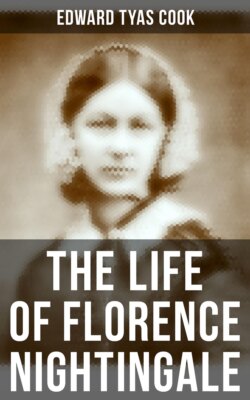Читать книгу The Life of Florence Nightingale - Edward Tyas Cook - Страница 61
На сайте Литреса книга снята с продажи.
IV
ОглавлениеPrivate support was forthcoming as readily as official. Mr. Henry Reeve, an old friend of Miss Nightingale and her family, rejoicing that she had now “an opportunity of action worthy of her,” spoke to the great Delane, and requested him to direct Mr. Macdonald—who was being sent out to administer the Times Fund—to co-operate with Miss Nightingale. Mr. Macdonald was a man, as Mr. Reeve testified, and as Miss Nightingale was to discover—to the great advantage of their common cause—“of remarkable intelligence and activity.”
Two days after the receipt of her official instructions, five days after her interview with Mr. Herbert, Miss Nightingale and her party left London (Oct. 21). The amount of work which fell upon Miss Nightingale during the ten days (Oct. 12–21) was enormous, and some of the details she was obliged to delegate to others. The headquarters of the expedition during its outfit were established at Mr. Sidney Herbert's house in Belgrave Square, and there Miss Mary Stanley and Mrs. Bracebridge interviewed applicants. Miss Nightingale, foreseeing (only too truly, as the event was to show) the difficulty both of finding suitable women and of supervising them, was inclined to limit the number to twenty. Mr. Herbert, thinking that such a new departure should be made on a considerable scale, proposed a larger number, and Miss Nightingale gave way. Forty was the number agreed upon; but the material which offered itself was not promising. “Here we sit all day,” wrote Miss Stanley; “I wish people who may hereafter complain of the women selected could have seen the set we had to choose from. All London was scoured for them. We sent emissaries in every direction to every likely place. … We felt ashamed to have in the house such women as came. One alone expressed a wish to go from a good motive. Money was the only inducement.”73 Ultimately thirty-eight nurses were obtained.
Mr. Herbert, in the concluding passage of his Instructions, relied on Miss Nightingale's vigilance to prevent religious “tampering.” This was an instruction which she had discussed with him, for she foresaw (again only too well) the odium theologicum that might confront her. She was primarily concerned to get the best nurses as such, but she was anxious also that the different churches or shades should be represented. In this desire she was in large measure disappointed. Application was made both to St. John's House, an institution inclined towards Tractarianism, and to the Protestant Institution for Nurses in Devonshire Square. In each case the answer was returned that nurses could only be supplied if they were to be subject to their own Committees; the Government's condition of subjection to Miss Nightingale's control was rejected. The authorities of St. John's House proposed that their nurses should be accompanied by the Master of the House, to act as “their guardian.” It will readily be imagined how impossible Miss Nightingale's position would have been on such terms. The proposal shows incidentally how little some people understood of the conditions of discipline necessary in a military hospital. Mr. Sidney Herbert, the Chaplain-General of the Forces, and Miss Nightingale met the Council of St. John's House; the point of Miss Nightingale's exclusive control was conceded, and the Master stayed at home. The Lady Superior of St. John's House at this time was Miss Mary Jones, who to the end of her life remained one of the most valued and tenderly devoted of Miss Nightingale's friends.74 The authorities in Devonshire Square, on the other hand, would not surrender the point of separate control, and accordingly no nurses were supplied by the distinctively Protestant institution. “We are only vexed,” wrote Lady Verney, “because Flo so earnestly desired to include all shades of opinion, to prove that all, however they differed, might work together in a common brotherhood of love to God and man.”
The party, as ultimately recruited, was composed of ten Roman Catholic Sisters (five from Bermondsey and five from Norwood), eight Anglican Sisters (from Miss Sellon's Home at Devonport), six nurses from St. John's House, and fourteen from various English hospitals. It has often been supposed that the nurses who accompanied Miss Nightingale were ladies of gentle birth, but, with a few exceptions, this was not the case. On the eve of their departure, the nurses were addressed by Mr. Herbert in his dining-room. He told them that if any desired to turn back, now was the time of decision, and he impressed upon them that all who went were bound implicitly to obey Miss Nightingale in all things. “All started on their ways,” we are told,75 “strengthened by his heart-stirring words, and cheered no less by the sunny brightness of his presence than by his kindly and unfailing sympathy.” Unhappily the effect was not in all cases permanent, as we shall hear.
